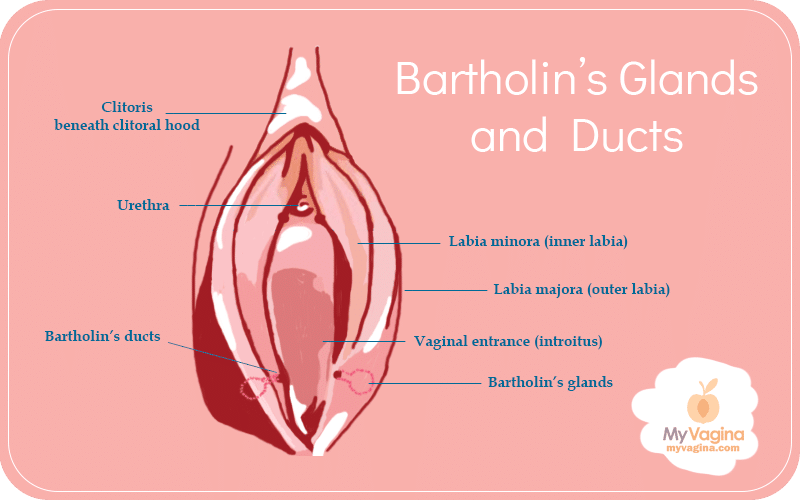The Bartholin glands are two tiny little glands sitting inside your labia minora (the inner labia), the lips that surround the vagina and urethra. These glands produce moisture on the outer section of your vagina – the vulva. The tubes open up next to the vaginal opening, and are called Bartholin ducts.
When you get a cyst in your Bartholin gland or duct, fluid builds up behind the blockage and will eventually start to produce symptoms that you can feel. This isn’t something that happens overnight; Bartholin gland cysts are slow-growing. If one gets infected, it is then termed a Bartholin gland abscess.
Bartholin’s cysts
These cysts can be as big as a pea or larger, more like a marble, but usually they are small and painless, and definitely not dangerous. A lot of these types of cysts can actually come and go and you’ll never know.
Symptoms of Bartholin cysts
Often there will be no symptoms with small cysts, but large cysts or infected abscesses are not going to go unnoticed for long.
Bartholin cyst symptoms (not infected)
- A lump in the vulvar area
- Redness or swelling on the vulva
- Pain or discomfort on sitting, sex, or even walking around
- Abnormal dryness of the vagina during sex
Bartholin abscess symptoms (infected)
- Pain on sitting, sex, walking or moving
- Chills
- Fever
- Swelling in the vulvar area
- Fluid coming out of a cyst that is not normal discharge
Treatments for Bartholin’s cysts and abscesses
If the cyst is infected, you definitely need treatment – you do not want to lose your Bartholin glands, as they make your sex life much better. Treatment may include sitz baths, antibiotics, Word catheters, marsupialisation, or in severe cases surgery to remove part or all of the duct or gland entirely.
Why do I have a Bartholin cyst or abscess?
It’s hard to know, but generally any kind of infection (including STIs), very thick mucous or any kind of genital swelling can trigger off a cyst. Or, it might just arrive without giving a reason, meaning you may never know. This becomes an issue if you are having repeated blockages, in which case you should see an experienced practitioner who can establish a cause.
Having sex is going to exacerbate the problem, as the more fluid the glands produce (during sexual arousal to make you wet and lubricated), the more gets stuck – and the less comes out. This can result in moderate dryness of the vagina, unusually so, during sex.
References
- Lee MY, Dalpiaz A, Schwamb R, Miao Y, Waltzer W, Khan A. Clinical Pathology of Bartholin’s Glands: A Review of the Literature. Curr Urol. 2015;8(1):22-5.
- Sosnik H, Sosnik K, Halon A. The pathomorphology of Bartholin’s gland. Analysis of surgical data. Pol J Pathol. 2007;58:99–103. [PubMed]
- Omole F, Simmons BJ, Hacker Y. Management of Bartholin’s duct cyst and gland abscess. Am Fam Physician. 2003;68:135–140. [PubMed]
The most comprehensive vaginal microbiome test you can take at home, brought to you by world-leading vaginal microbiome scientists at Juno Bio.
Unique, comprehensive BV, AV and 'mystery bad vag' treatment guide, one-of-a-kind system, with effective, innovative treatments.
Promote and support a protective vaginal microbiome with tailored probiotic species.






